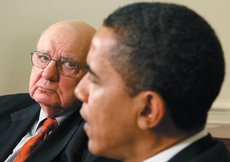
By Paul Volker in the New York Review of Books
Some five years ago, at a conference of the Stanford Institute for Economic Policy Research, I lamented that “the growing imbalances, disequilibria, risks” were giving rise to “circumstances as dangerous and intractable” as any I could recall—intractable not just because of the combination of complicated issues, but because there seemed to be “so little willingness or capacity to do much about it.”
Part of the story is familiar. In the United States, savings practically disappeared as consumption rose far above past relationships to national production. That consumption was satisfied by rapidly growing imports from China and elsewhere in Asia at remarkably cheap prices, helping to keep inflation well subdued. The resulting seemingly inexorable increase in our current account deficit was easily financed by an equally large flow of short-term funds from abroad at exceptionally low interest rates. In fact, money was so easily available that it supported what became a bubble in housing, with rising home prices reinforcing a sense of prosperity and high consumption.
It was not so much that the imbalances were hidden or unknown. In particular, the Chinese surpluses and American deficits were widely thought to be unsustainable. But for the time being, the world economy was growing strongly. China in particular was mainly interested in developing its industry by encouraging exports, and the United States was not prepared to balance its national budget or to restrain the consumption and housing boom.
At the time, I suggested that the most likely result would not be well- thought-out and complementary policy actions. Rather, sooner or later, the necessary changes would be forced by a financial crisis.
I certainly did not anticipate the nature of the crisis that eventually ensued, its complexity, its force, or its impact right across the industrialized world. Subprime mortgages, credit default swaps, CDOs—squared, tranched, or otherwise—were not part of my world. Nor, I can add, had I ever imagined that the financial markets over those frightening weeks in the fall of 2008 would virtually freeze up. The sense of mutual trust upon which operating financial markets depend was lost.
Now we know that trillions of dollars of official funds came to the rescue of the broken system in the form of loans, capital, and guarantees. Flows of finance have been restored, albeit with large areas of continuing public support. The residential mortgage market in the United States—by far the largest sector of our capital market for the time being—remains almost wholly a ward of the government. Now, another range of uncertainty has arisen. Sovereign credits have come into question, most pointedly in the Eurozone but potentially of concern among some of our own states.
Any thoughts—any longings—that participants in the financial community might have had that conditions were returning to normal (implicitly promising the return of high compensation) should by now be shattered. We are left with some very large questions: questions of understanding what happened, questions of what to do about it, and ultimately, questions of political possibilities. The way those questions are answered will determine whether, in the end, the financial crisis has, in fact, forced the changes in thinking and in policies needed to restore a well-functioning financial system and better-balanced growing economies.
Read the rest at by Paul Volker in the New York Review of Books.
ATTENTION READERS
We See The World From All Sides and Want YOU To Be Fully InformedIn fact, intentional disinformation is a disgraceful scourge in media today. So to assuage any possible errant incorrect information posted herein, we strongly encourage you to seek corroboration from other non-VT sources before forming an educated opinion.
About VT - Policies & Disclosures - Comment Policy



